Once again. The peculiar orbit of Mercury (Yggr, Woden, etc)
could be depicted as the body of a snake. The faces (phases) of Mecury
were
like that.
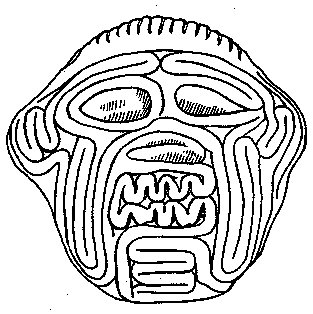 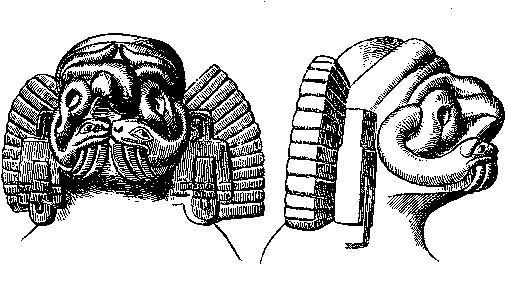
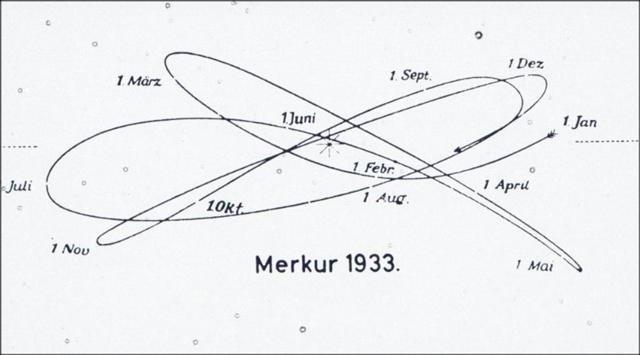
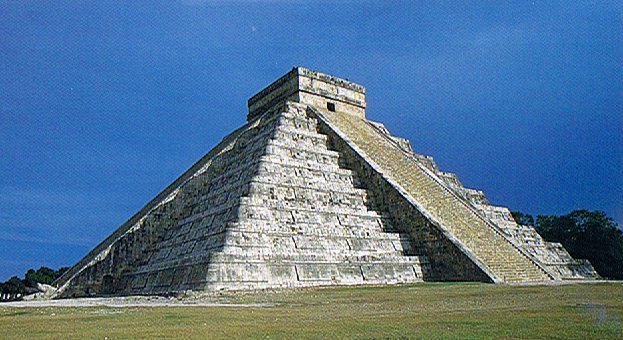
Or the orbits of Mercury were like
intestines -
as I remember it from the sentence for someone who had cut away
the bark from a living tree. They took out his intestine and
nailed it to the stem of the tree and then he had to run around
it until the intestine reached to its end.
We can also recognize the body
(orbit) of Mercury in his leggings:
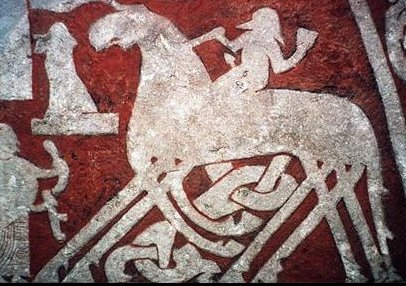
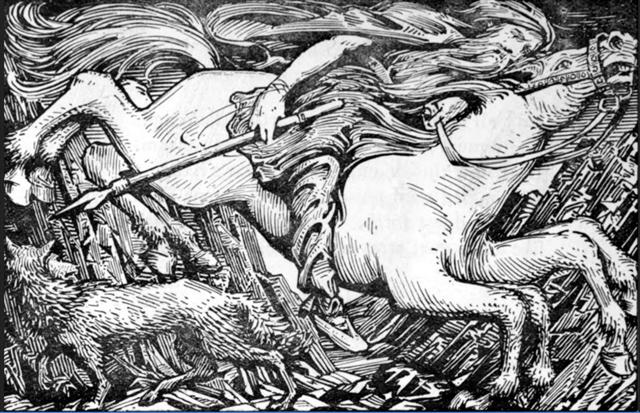
But if the last one in the list of the
'assassinators' (toa) was Mercury (Marikury), then we ought to find also
the other planets in the 'sugarcane' list:
|
he toa |
... 'Canne à sucre en fleur'
(blooming sugar cane) is the explanation given by
Bishop Jaussen (according to Barthel):
Die in den Metorogesängen oft
vorkommende Benennung der Zeichen 65 bzw. 66 als
toa wurde von Jaussen auf das Zuckerrohr
bezogen; eine Auffassung, die keine Stütze
in den Tafeltexten findet.
Berücksichtigt man
aber, daß die Metorogesänge phonetisch nicht immer
ganz exakt niedergeschrieben wurden, so findet man
eine sinnvolle Lösung, wenn man zwischen
tôa und
to'a underscheidet:
Das erste Wort bedeutet Zuckerrohr, das zweite
dagegen Feind, Mörder.³
³) Englert
1948, 503: 'caña de azucar' bzw. 'enemigo; asesino'.
Ferner: he to'a o te îka, el que ha dado muerte a
una persona'. |
|
1 |
he |
rangi koro vao. |
a Teke. a Oti. |
|
2 |
tua mamari manu. |
|
3 |
tua manu auau |
|
4 |
ruma. |
|
5 |
tuitui koviro. |
|
6 |
vitiviti. |
|
7 |
marikuru. (*111) |
|
huru o te me'e |
toa |
|
ngaatu (*84) |
19 |
ipu ngutu (*104) |
6 |
marikuru (*111) |
|
BETELGEUZE (*88) |
*108 = *62 + *46 |
YGGR (*115) |
|
21 days |
7 days |
|
4 weeks |
|
he pua nakonako. |
he ipu ngutu (*104) |
he rangi koro vao. |
he tua mamari manu. |
he tua manu auau |
|
a Oti. |
a Teke. a Oti. |
|
The expressions Tonga, Kona,
Toa (Sam., Haw., Tah.), to indicate
the quarter of an island or of the wind,
between the south and west, and Tokelau,
Toerau, Koolau (Sam., Haw.,
Tah.), to indicate the opposite directions
from north to east - expressions universal
throughout Polynesia, and but little
modified by subsequent local circumstances -
point strongly to a former habitat in lands
where the regular monsoons prevailed.
Etymologically 'Tonga', 'Kona',
contracted from 'To-anga' or 'Ko-ana',
signifies 'the setting', seil. of the sun. 'Toke-lau',
of which the other forms are merely
dialectical variations, signifies 'the cold,
chilly sea'.
Fornander. |
|
MAY 3 |
4 (4 * 31 = 124) |
5 |
6 (*46) |
7 (127) |
 |
 |
 |
 |
 |
|
Ga2-13 |
Ga2-14 |
Ga2-15 (45) |
Ga2-16 |
Ga2-17 |
|
WEZEN (Weight)
=
δ
Canis Majoris
(107.1),
τ
Gemini (107.7),
δ
Monocerotis (107.9) |
no star listed (108) |
λ Gemini (109.4),
WASAT
(Middle)
= δ Gemini
(109.8)
*68.0 = *109.4 - *41.4 |
no star listed (110) |
ALUDRA (Virgin)
= η Canis Majoris
(111.1),
PROPUS
= ι Gemini
(111.4),
GOMEISA (Water-eyed)
= β Canis Minoris
(111.6)
*70.0 = *111.4 - *41.4 |
|
July 6 |
7 (188 =
84 + 104) |
8 |
9 |
10 |
|
°July
2 |
3 (184 =
80 + 104) |
4 |
5 |
6 (*107) |
|
'June 9 |
10 (161) |
11 |
12 |
13 (*84) |
|
... The month, which takes its name from
Juppiter the oak-god, begins on June 10th
and ends of July 7th. Midway comes St.
John's Day, June 24th, the day on which the
oak-king was sacrificially burned alive. The
Celtic year was divided into two halves with
the second half beginning in July,
apparently after a seven-day wake, or
funeral feast, in the oak-king's honour ...
 |
|
"May 26 |
27 |
28 (148) |
29 |
30 (*70) |
|
CLOSE TO
THE FULL MOON: |
|
NOV 2 |
3 |
4 |
5 (*229) |
6 (310) |
|
Al Baldah-19 (City)
AL BALDAH
= π Sagittarii,
ALPHEKKA (Dish) MERIDIANA
= α Cor. Austr.
(290.1), β Cor. Austr. (290.2) |
ALADFAR (The Talons)
= η Lyrae
(291.1),
NODUS II = δ Draconis
(291.5), ψ Sagittarii (291.6), τ Draconis
(291.7), θ Lyrae (291.8) |
ω Aquilae (292.1), ρ Sagittarii (292.6), υ
Sagittarii (292.7) |
π Draconis,
ARKAB PRIOR = β¹ Sagittarii
(293.0),
ARKAB POSTERIOR = β² Sagittarii,
ALRAMI (The Archer)
= α Sagittarii
(293.2), χ Sagittarii (293.6) |
DENEB OKAB (Tail of the Eagle)
=
δ
Aquilae (Ant.)
(294.0),
α VULPECULAE (Little Fox)
(294.9) |
|
Jan 5
(*290) |
6 |
7 (372) |
8 |
9 |
|
°Jan 1 |
2 |
3 (368) |
4 |
5 (*290) |
|
'Dec 9 |
10 (*264) |
11 (345) |
12 |
LUCIA |
 |
|
"Nov 25 |
26 (*250) |
27 |
28 (360) |
29 |
|
he ruma. |
he tuitui koviro. |
he vitiviti. |
he
marikuru. |
|
|
|
MAY 8 |
9 |
10 (130) |
11 |
12 |
13 (*53) |
 |
 |
 |
 |
 |
 |
|
Ga2-18 |
Ga2-19 |
Ga2-20 (50) |
Ga2-21 |
Ga2-22 |
Ga2-23 |
|
ρ Gemini (?) (112.1),
Eskimo Nebula
= NGC2392 Gemini
(112.2)
ANTARES (α Scorpii) |
Al Dhirā'-5 (Forearm) /
Punarvasu-7 (The Two Restorers of Goods) /
Mash-mashu-Mahrū-10 (Western One of the
Twins)
CASTOR
= α Gemini
*113.4 = *41.4 + *72.0 |
ANA-TAHUA-VAHINE-O-TOA-TE-MANAVA-7 (Pillar
for elocution)
υ Gemini (114.0),
MARKAB PUPPIS
= κ Puppis
(114.7), ο Gemini (114.8),
PROCYON
= α Canis Minoris
(114.9) |
α Monocerotis
(115.4), σ Gemini (115.7)
*74.0 = *115.4 - *41.4 |
Mash-mashu-arkū-11 (Eastern One of the
Twins)
κ Gemini (116.1),
POLLUX
= β Gemini
(116.2), π Gemini (116.9) |
AZMIDISKE
= ξ Puppis
(117.4)
*76.0 = *117.4 - *41.4 |
 |
|
July 11 |
12 (193) |
13 |
(*115 →
Mercury) |
15 |
16 |
|
°July 7 |
8 |
9 |
10 (*111) |
11 |
12 (193) |
|
'June 14 |
15 |
16 |
17 (*88) |
18 |
19 (*90) |
|
"May 31 |
Te Maro 1 |
2 |
3 |
4 (*75) |
5 (156) |
|
On the
twenty-fifth day [raa] of the first
month ('Vaitu Nui'), Ira and Makoi
set sail; on the first
day [te raa po rae] of the month of
June ('Maro'), the bow [te ihu]
of Ira's canoe touched land again. [E:17] |
|
CLOSE TO
THE FULL MOON: |
|
NOV 7 |
8 |
9 |
10 (314 →
π) |
11 |
12 (*236) |
|
ν
Aquilae (Ant.) (295.0),
ALBIREO - Hen's Beak
=
β
Cygni
(295.5) |
ALSAFI (Fire Tripod)
=
σ
Draconis
(296.0),
μ
Aquilae (296.3),
ι
Aquilae (Ant.)
(296.8), κ Aquilae (Ant.) (296.9) |
ε Sagittae (297.1), σ Aquilae (Ant.)
(297.4),
SHAM (Arrow)
= α Sagittae
(297.8)
*256.0 = *297.4 - *41.4 |
β Sagittae (298.0), χ Aquilae (298.3), ψ
Aquilae (298.8) |
υ Aquilae (299.1),
TARAZED (Star-striking Falcon)
= γ Aquilae
(299.3), δ Sagittae (299.6), π Aquilae
(299.9) |
Sravana-23 (Ear or Three Footprints)
TYL
=
ε
Draconis
(300.0),
ζ
Sagittae (300.1),
ALTAIR (Flying Eagle)
=
α
Aquilae
(300.3),
ο
Aquilae (300.5),
BEZEK
=
η
Aquilae
(Ant.)
(300.8) |
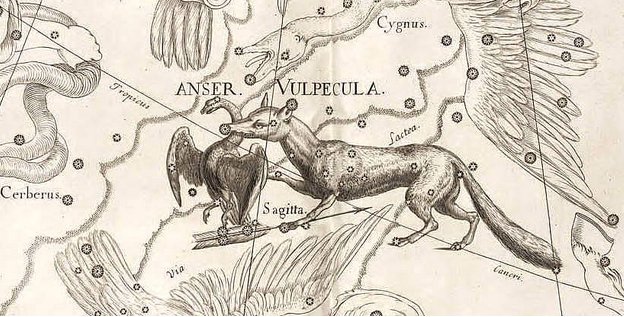 |
|
Jan 10 |
11 |
12 |
(378 →
Saturn) |
14 |
15 (*300) |
|
°Jan 6 |
7 (372) |
8 |
9 |
10 (*295) |
11 |
|
'Dec 14 |
15 |
16 (350) |
17 |
18 |
19 (*273) |
|
"Nov 30 |
"Dec 1 |
2 (336 =
4 * 84) |
3 |
4 |
5 (*259) |
So far, however, I have no clue as to the positions
of the other planets (if they indeed can be put in
parallel with the other toa varieties).
Let's therefore instead here document the fact that there
was a pair of ngaatu species brought onboard, not
only the one at the Julian equinox (*84 at the time of
Gregory XIII),
|
huru o te me'e |
toa |
|
ngaatu (*84) |
19 |
ipu ngutu (*104) |
6 |
marikuru (*111) |
|
BETELGEUZE (*88) |
*108 = *62 + *46 |
YGGR (*115) |
|
21
days |
7
days |
|
4
weeks |
|
he huru o te me'e
[E:69]
Huru. Custom,
tradition, behaviour,
manners, situation, circumstances; poki huru hare,
child who stays inside (to keep a fair
complexion); te huru o te tagata
rivariva, a fine person's behaviour;
pehé te huru o Hiva? what is the
situation on the mainland? Huruhuru,
plumage, feathers (the short
feathers, not the tail feathers),
fleece of sheep. Vanaga. Samoa: sulu,
a torch; to light by a torch;
sulusulu, to carry a torch;
susulu, to shine (used of the
heavenly bodies and of fire). Futuna:
susulu, the brightness of the moon.
Tonga: huluaki, huluia,
huluhulu, to light, to enlighten;
fakahuhulu, to shine; iuhulu,
a torch or flambeau, to light with a
torch. Niuē: hulu, a torch;
huhulu, to shine (as the moon).
Maori: huru, the glow of the sun
before rising, the glow of fire.
Churchill 2. |
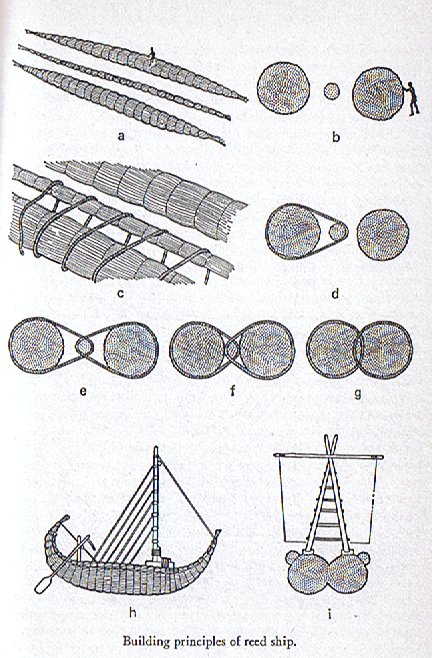
...
The planting of rushes in the crater
lakes is supposed to have been the work
of the culture hero Ure.
Proceeding from Anakena, Ure
planted the top part of the plant in
Rano Aroi, the stem in Rano
Raraku, and the bottom part in
Rano Kau (ME:364) ...
Gaatu, totora
reed. Vanaga. Gaatu 1.
Bulrush, reed. 2. (gatu).
Churchill.Gatu. Gaatu, totora
reed. Gatu: 1. To press, to
tighten, to squeeze. 2. To pack tight.
3. To pull suddenly, to give a jerk.
I ka hakarogo atu, ku eke á te kahi, he
gatu mai, as soon as he felt the
tuna be, he pulled in [the line] with a
sharp jerk. 4. To kick. 5. E gatu te
hagu, to wait for something
impatiently (gatu, breath). 6.
Shortly, very soon. He tu'u gatu,
he is coming shortly, he is just about
to arrive. Vanaga. Bulrush, reed.
Gaatu (gatu) 1. To feel of,
to pinch, to throttle with the hands, to
touch, to press (gaatu);
gatuga, pressure; gatugatu,
to trample down. T Mgv.: natu, to
press out linen, to squeeze a person or
a sore place. Mq.: natu, to
pinch. Ta.: natu, to pinch, to
bruise. 2. To suppurate. 3. Gatu mai
gatu atu, sodomy. Gatua (gatu
1), tractable, to press.
Churchill. Scirpus riparius var.
paschalis. Barthel 2. |
|
1 |
he |
ngaatu (*84) |
a Oti. |
|
1 |
tavari |
|
1 |
riku |
|
1 |
ngaoho |
|
1 |
naunau. |
|
1 |
uku koko |
|
1 |
nehenehe (*90) |
|
1 |
poporo. |
|
1 |
kavakava atua |
|
1 |
kohe. |
|
1 |
nehenehe [sic!] |
|
1 |
pua |
|
1 |
harahara (*96) |
|
1 |
hua taru. |
|
1 |
makere |
|
1 |
hata. |
|
1 |
tuere heu. (*100) |
|
1 |
tureme |
|
1 |
matie. |
|
1 |
pua nakonako. |
|
1 |
ipu ngutu (*104) |

...
The state of the tree
loomed large in their thoughts, because
it came about at the same time the head
of One Hunaphu was put in the fork. The
Xibalbans said among themselves: 'No one
is to pick the fruit, nor is anyone to
go beneath the tree', they said. They
restricted themselves, all of Xibalba
held back.
It
isn't clear which is the head of One
Hunaphu; now it's exactly the same as
the fruit of the tree. Calabash came to
be its name, and much was said about it.
Hipu. Calabash,
shell, cup, jug, goblet, pot, plate,
vase, bowl, any such receptacle; hipu
hiva, melon, bottle; hipu
takatore, vessel; hipu unuvai,
drinking glass. P Mgv.: ipu,
calabash, gourd for carrying liquids.
Mq.: ipu, all sorts of small
vases, shell, bowl, receptacle, coconut
shell. Ta.: ipu, calabash, cup,
receptacle. Churchill.
Gutu. 1. Lips,
mouth, beak, snout (goutu);
gutu ahu, swollen lip; gutu hiti,
thick lip; gutu mokomoko, pointed
lip; gutu no, vain words;
gutu pakapaka, scabbed lips;
gutu raro, lower lip; gutu ruga,
upper lip. Gutugutu, snout. P
Pau.: gutu, lip, beak, bill.
Mgv.: gutu, the chin, the mouth
of a fish. Mq.: nutu, beak,
snout. Ta.: utu, lip, mouth,
beak, snout. Gutupiri,
attentively. Gututae,
attentively; gututae mekenu, a
small mouth. Gututika, tattoing
on the lips. 2. Pau.: Gutuafare,
to save, to economize. Ta.: utuafare,
family, residence. 3. Pau.: Guturoa,
to grimace, to pout. Mgv.: guturoa,
to grimace. Churchill.
|
 |
|
hipu |
|
but also the 3rd variant of taro was a ngaatu
type:
|
10 + 2 variants of
taro brought by Oti from the
plantation of Teke: |
|
1 |
ngeti uri. |
a Teke. a Oti. |
|
2 |
ngeti tea. |
|
3 |
he ngaatu. (*72) |
|
4 |
he tuitui koviro. |
|
5 |
he ketu anga mea. |
|
6 |
he ketu takarua. |
|
7 |
he teatea. |
|
8 |
he ngu haha tea. |
|
9 |
he mango. |
|
10 |
he hahara rapanui
(*79) |
|
1 |
he ti. |
|
1 |
he kape. |
|
10 + 2 taro variants |
hauhau |
mahute (*83) |
|
2 |
ngaatu (*72) |
7 |
ti (*80) |
kape |
|
CURSA (*76) |
PHAKT (*84) |
YANG MUN |
SAIPH |
WEZN (*87) |
|
14 days |
|
2 weeks |
|
huru o te me'e |
toa |
|
ngaatu (*84) |
19 |
ipu ngutu (*104) |
6 |
marikuru (*111) |
|
BETELGEUZE (*88) |
*108 = *62 + *46 |
YGGR (*115) |
|
21 days |
7 days |
|
4 weeks |
In order to accomodate the Gregorian
positions of the stars we have to add 4
right ascension days, which will bring us up to
the epoch of rongorongo:
... So the shift in the
date of the equinox that occurred between
the 4th and the 16th centuries was annulled
with the Gregorian calendar, but nothing was
done for the first four centuries of the
Julian calendar. The days of 29 February of
the years AD 100, AD 200, AD 300, and the
day created by the irregular application of
leap years between the assassination of
Caesar and the decree of Augustus
re-arranging the calendar in AD 8, remained
in effect. This moved the equinox four days
earlier than in Caesar's time ...
|
2 he ngeti tea. |
3 he ngaatu. (*72) |
4 he tuitui koviro. |
5 he ketu anga mea. |
|
Gaatu,
totora reed. Vanaga.
Gaatu 1.
Bulrush,
reed. 2. (gatu).
Churchill.Gatu. Gaatu,
totora reed. Gatu: 1.
To press, to tighten, to
squeeze. 2. To pack tight.
3. To pull suddenly, to give
a jerk. I ka hakarogo
atu, ku eke á te kahi, he
gatu mai, as soon as he
felt the tuna be, he pulled
in [the line] with a sharp
jerk. 4. To kick. 5. E
gatu te hagu, to wait
for something impatiently (gatu,
breath). 6. Shortly, very
soon. He tu'u gatu,
he is coming shortly, he is
just about to arrive.
Vanaga. Bulrush, reed.
Gaatu (gatu) 1.
To feel of, to pinch, to
throttle with the hands, to
touch, to press (gaatu);
gatuga, pressure;
gatugatu, to trample
down. T Mgv.: natu,
to press out linen, to
squeeze a person or a sore
place. Mq.: natu, to
pinch. Ta.: natu, to
pinch, to bruise. 2. To
suppurate. 3. Gatu mai
gatu atu, sodomy.
Gatua (gatu 1),
tractable, to press.
Churchill. Scirpus
riparius var.
paschalis. Barthel 2.

... All
this, which in so many ways
parallels the normal imagery
of the Old World
culture-hero myths, telling
of the one who is gone,
dwells underground in a
happy, timeless land, as
lord of the realm of the
happy dead, like Osiris,
but will rise again, we can
read
without
surprise. But what is
surprising indeed was the
manner of Quetzalcoatl's
actual return. The priests
and astrologers did not know
in what cycle he was to
reappear; however, the name
of the year within the cycle
had been predicted, of old,
by Quetzalcoatl
himself. Its sign was 'One
Reed' (Ce Acatl),
which, in the Mexican
calendar, is a year that
occurs only once in every
cycle of fifty-two. But the
year when Cortes arrived,
with his company of
fair-faced companions and
his standard, the cross, was
precisely the year 'One
Reed'. The myth of the dead
and resurrected god had
circumnavigated the globe
... |
|
MARCH 28 |
29 (88) |
30 |
31 (*10) |
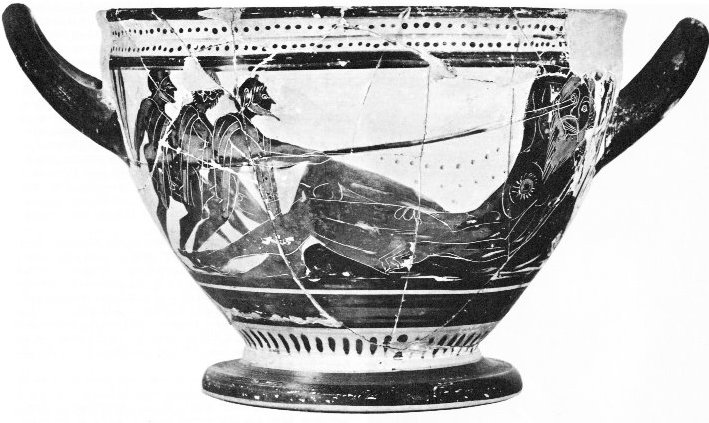
... 'Yes, for he was a
monstrous thing and
fashioned marvelously, nor
was he like to any man that
lives by bread, but like a
wooded peak of the towering
hills, which stands out
apart and alone from
others.' Odysseus, choosing
twelve men, the best of the
company, left his ships at
shore and sallied to the
vast cave. It was found
stocked abundantly with
cheeses, flocks of lambs and
kids penned apart, milk
pails, bowls of whey; and
when the company had entered
and was sitting to wait,
expecting hospitality, the
owner came in, shepherding
his flocks. He bore a
grievous weight of dry wood,
which he cast down with a
din inside the cave, so that
in fear all fled to hide.
Lifting a huge doorstone,
such as
two
and twenty good [maitaki]
four-wheeled wains
could not have raised from
the ground, he set this
against the mouth of the
cave, sat down, milked his
ewes and goats, and beneath
each placed her young, after
which he kindled a fire and
spied his guests ... |
 |
 |
 |
 |
|
Ga1-7 |
Ga1-8 |
Ga1-9 |
Ga1-10 |
|
TABIT
=
π³
Orionis
(71.7),
π²
Orionis (71.9)
320 (South Pole star,
Dramasa) - 71 (Tabit) = 249
(Antares) |
π4
Orionis (72.1),
ο¹
Orionis (72.4),
π5
Orionis (72.8)
*31.0 = *72.4 - *41.4 |
π¹
Orionis (73.0),
ο²
Orionis (73.4),
HASSALEH
=
ι
Aurigae
(73.6),
π6
Orionis (73.9)
*32.0 = *73.4 - *41.4 |
ALMAAZ (The Male Goat)
=
ε
Aurigae
(74.7),
HAEDUS I
=
ζ
Aurigae
(74.8) |
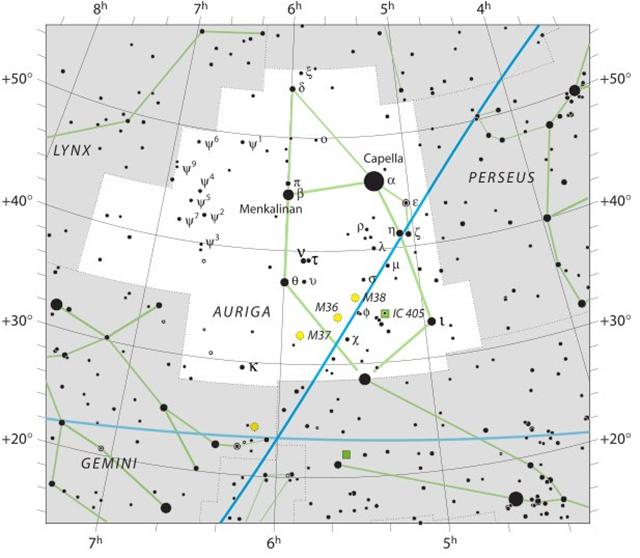 |
|
May 31 |
June 1 (152) |
2 (*73) |
3 |
|
°May 27 |
28 (148) |
29 |
30 |
|
'May 4 |
5 (125) |
6 (*46) |
7 |
|
"April 20 |
21 (111) |
22 (*32) |
23 |
|
CLOSE TO THE FULL MOON: |
|
SEPT 27 (270 = 3 * 90) |
28 |
29 |
30 (*193) |
|
Tail-6 (Tiger)
WEI (Tail)
= ε Scorpii,
η Arae (254.3),
DENEBAKRAB
= μ Scorpii
(254.7) |
ι Ophiuchi (255.3),
GRAFIAS
(Claws)
= ζ Scorpii
(255.4)
*214.0 = *255.4 - *41.4 |
κ Ophiuchi (256.2), ζ Arae
(256.5), ε Arae (256.8),
CUJAM (Club)
= ε Herculi
(256.9) |
no star listed (257) |
|
Nov 30 |
Dec 1 |
2 (4 * 84 = 336) |
3 |
|
°Nov 26 |
27 |
28 |
29 (333) |
|
'Nov 3 |
4 |
5 |
6 (310) |
|
"Oct 20 |
21 (*214) |
22 (295) |
23 |
 |
And since totora reeds were
necessary for travelling upon the
sea,
ngaatu may well have been chosen at the
beginning of the voyage across from
Cursa to Rigel as well as for the
beginning of the
voyage from
Betelgeuze across the Milky Way
to Gemini.
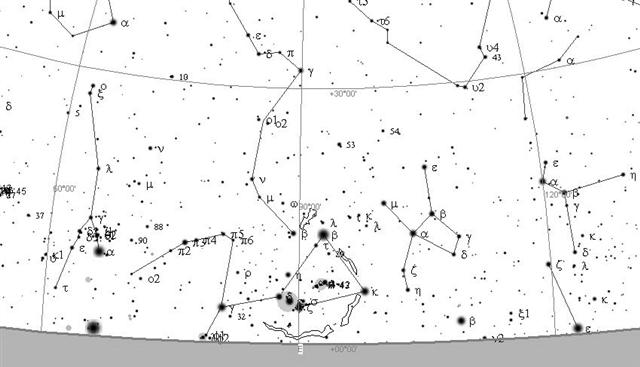
For the right ascension
positions of the Gregorian epoch
were evidently corresponding to
the ordinal numbers of the items
here brought onboard the Royal Ship.
Therefore item number 72 for
ngaatu in the taro list can
also be put in
parallel with right ascension
position *76 (Cursa) at the time of
rongorongo.
Likewise should Betelgeuze (*88)
be put in parallel with the
first item on the list of 'all
sorts of things', because at the
time of the Pope Betelgeuze had
been at right ascension day *84.

After this realignment (hahara) the new order
will put the first ngaatu
item at the time when the
Explorers left Hiva, viz. in day
115 according to the epoch of
Bharani. Indeed, we remember,
Hiro (Mercury) was a mighty
sailor.
... A
marae was made for him in
the little house aft of the
deck, and the three masts were
rigged with ropes and strong
mats for sails and long tapa
pennants streaming from them ...
Within a few days the canoe was
loaded with provisions. Great
fish baskets were made of
bamboo, filled with many kinds
of fish, and attached to the
outside of the canoe so as to be
in the water. Bamboos and gourds
were filled with water and
stowed away on board, and there
were fe'i, bananas, taro,
and mahi (fermented
breadfruit) in abundance. A bed
of sand and stones was made upon
the deck, upon which to make a
fire for cooking the food, and
soon Hiro was ready to go
to sea. Hiro was the
captain and pilot, and he had
other competent seamen, who like
him were acquainted with the
heavenly bodies and their rising
and setting. Women and children
also accompanied their husbands
and fathers on board, and on one
fine day, with a strong
favorable wind, they set sail,
applauded by many spectators,
among whom were prisoners of war
(called tîtî), whose
shouts were heard above all
others. They saw Hiro's
great pahi sail out to
sea and disappear beyond the
horizon, never again to return
to Tahitian shores ...
|
2 ngeti
tea. |
3 ngaatu. (*72) |
4 he
tuitui koviro. |
5 ketu
anga mea. |
6 ketu
takarua. |
|
Ketu.
To bound, to climb
over, to leap, to jump,
to raise (keetu).
Mq. ketu, to
raise, to lift.
Ketuketu, to spread
out, hihi
ketuketu, to turn
back the eyelids.
Churchill. Pau.:
Ketuketu, to dig.
Ta.: etuetu, id.
Mq.: ketu, to dig
up with the snout. Ma.:
ketu, id.
Churchill. Mq.:
ketuketu, to snuff a
candle. Sa.: eueu,
id. Churchill.
Taka,
takataka.
Circle; to form circles,
to gather, to get
together (of people).
Vanaga. 1. A dredge. P
Mgv.:
akataka,
to fish all day or all
night with the line, to
throw the fishing line
here and there. This can
only apply to some sort
of net used in fishing.
We find in Samoa
ta'ā a small
fishing line, Tonga
taka the short line
attached to fish hooks,
Futuna taka-taka
a fishing party of women
in the reef pools (net),
Maori takā the
thread by which the
fishhook is fastened to
the line, Hawaii kaa
in the same sense,
Marquesas takako
a badly spun thread,
Mangareva takara
a thread for fastening
the bait on the hook. 2.
Ruddy. 3. Wheel, arch;
takataka, ball,
spherical, round,
circle, oval, to roll in
a circle, wheel,
circular piece of wood,
around; miro takataka,
bush; haga takataka,
to disjoin;
hakatakataka, to
round, to concentrate. P
Pau.: fakatakataka,
to whirl around. Mq.:
taka, to gird. Ta.:
taa, circular
piece which connects the
frame of a house.
Churchill.Takai,
a curl, to tie;
takaikai, to lace
up; takaitakai,
to coil. P Pau.:
takai, a ball, to
tie. Mgv.: takai,
a circle, ring, hoop, to
go around a thing. Mq.:
takai, to voyage
around. Ta.: taai,
to make into a ball, to
attach. Churchill. |
|
APRIL 1 (59 + 32) |
2 |
3 (*13) |
4 |
5 (95) |
 |
 |
 |
 |
 |
|
Ga1-11 |
Ga1-12 |
Ga1-13 |
Ga1-14 |
Ga1-15 |
|
HAEDUS II
= η Aurigae
(75.9) |
5h (76.1)
ε
Leporis (76.0),
CURSA
(Footstool)
=
β
Eridani
(76.4),
λ
Eridani (76.7)
*35.0 = *76.4 - *41.4 |
μ Aurigae, μ Leporis
(77.6) |
ĸ Leporis (78.0),
RIGEL
(Foot)
=
β
Orionis
(78.1),
Flaming Star = IC405
(78.2),
CAPELLA
=
α
Aurigae
(78.4),
ο
Columbae,
τ
Orionis (78.8)
*37.0 = *78.4 - *41.4
THUBAN (α Draconis)
|
λ Aurigae (79.0), λ
Leporis (79.6), ρ
Aurigae (79.7)
ARCTURUS (α Bootis) |

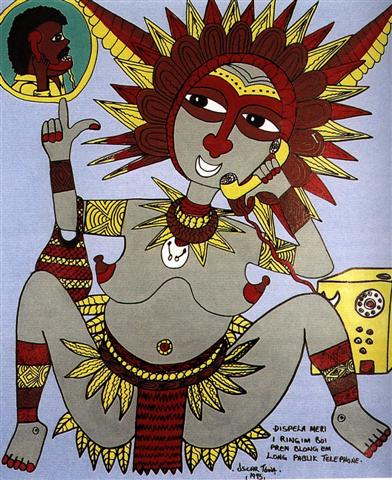
|
 |
 |
|
hanau |
RIGEL & CAPELLA
|
Hanau. 1. Race,
ethnic group. Hanau
eepe, the thick-set
race; hanau momoko,
the slender race (these
terms were mistranslated
as 'long-ears' and
'short-ears'). 2. To be
born. Hanau tama,
pregnant woman; vî'e
hanau poki, midwive
(also: vî'e hakaa'u).
Vanaga. To be born;
vie hanau,
midwife. P Pau.:
fanauga, child,
descendant, progeny.
Mgv.: hanau, to
be born, to be brought
into the world. Mq.:
fanau, hanau,
to be born, to lie in,
to bring into the world.
Ta.: fanau, to be
born, to lie in.
Churchill. |
|
June 4 |
5 |
6 (157 = 314 / 2) |
7 (94 + 64) |
8 (*444) |
|
°May 31 (151) |
°June 1 |
2 (*73) |
3 (94 + 60) |
4 (*440) |
|
'May 8 (128) |
9 |
10 (*50) |
11 (94 + 37) |
12 (*52) |
|
"April 24 (114) |
Vaitu
Nui 25 (*35) |
26 (4 * 29) |
27 (94 + 23) |
28 (118 = 4 * 29) |
|
...
The Explorers had left
their old homeland in
"April 25 (115) -
implying the synodic
cycle of Mercury - and
they
had
returned half a year
later, in "October 25
(298 = 115 + 183), which
was 10 days after the
arrival of the Royal
Double Canoe ...
... Ganz ähnlich is der
Name 'Gott von Duazag'
des Gottes Nabū
... zu erklären.
Er
bezeichnet ihn als den
Gott des Wachtstums,
welches als aus dem
Osten stammend
betrachtet wird, weil
die Sonne, die das
Wachstum bringt, im
Osten aufgeht.
Dass aber Nabū
als Ost-Gott aufgefasst
wurde, hängt damit
zusammen, dass sein
Stern, der Mercur, nur
im Osten oder Westen
sichtbar ist ...

 
 |
|
CLOSE TO THE FULL MOON: |
|
OCT 1 (91 + 183) |
2 (275) |
3 |
4 |
5 |
|
17h (258.7)
ARRAKIS = μ Draconis
(258.7) |
Mula-19 (The Root)
SABIK (The Preceding
One)
=
η
Ophiuchi
(259.7),
η
Scorpii (259.9) |
NODUS I =
ζ
Draconis
(260.0),
π
Herculis (260.7),
RAS ALGETHI (Head of the
Giant)
=
α
Herculis
(260.8) |
SARIN =
δ
Herculis
(261.0),
ο
Ophiuchi (261.4)
*220.0 = *261.4 - *41.4
ALRISHA (α Piscium) |
ξ Ophiuchi (262.2), θ
Ophiuchi, ν Serpentis,
ζ, ι Apodis (262.4), ι
Arae (262.8), ρ Herculis
(262.9)
*221.0 = *262.4 - *41.4 |
|
Dec 4 |
5 |
6 (*260) |
7 |
8 (342) |
|
°Nov 30 |
°Dec 1 (335) |
*(8 * 32) |
3 |
4
|
|
'Nov 7 |
8 (*232) |
9 |
10 (314) |
11 |
|
"Oct 24 |
Tangaroa Uri 25 |
26 |
27 (300) |
28 |
|
... Page E:86 tells
about Makoi being
left behind on Easter
Island when the
remaining 5 Explorers
sailed home to Hiva.
From there (Tangaroa
Uri 25) to the day
when Hotu became
worried about where
Oto Uta was, i.e. in
Tangaroa Uri 30,
there were 5 days:
|
April 25
(115) |
5 + 56 |
June 25
(176) |
5 + 116 |
Oct 25 (298) |
5 + 56 |
Dec 25 (359) |
5 + 116 |
|
61 |
2 * 61 |
61 |
2 * 61 |
|
183 |
183 |
|
366 = 2 *
183 = 6 * 61 |
And from the autumn
equinox (265) at Antares
to the Sting of the
Scorpion (υ
Scorpii) there were 15
days
...
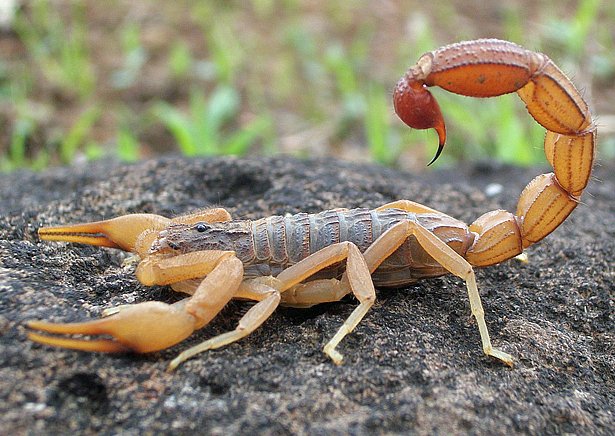
...
the tubers [of kape]
had to be kept in the
earth-oven for 15 (sic)
days in order to
eliminate some of the
poisonous components ...
2 *
175 (Day of St John) =
350 = 365 - 15.
... Thus the regular old
Roman year ended with
Februarius 23 and it was
350 nights long, 25
fortnights ... |
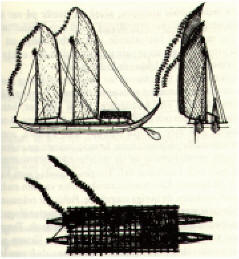
|































